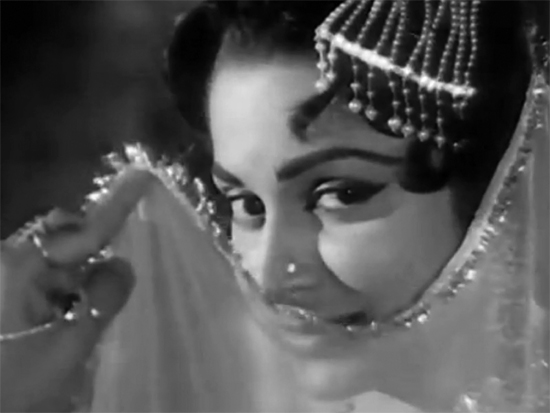With her charisma, expertise and legacy of impactful roles, Waheeda Rehman is a worthy subject of discourse for cinema lovers. Nasreen Munni Kabir's questioning style, though gentle and well-informed, veers away from certain insights which could have been pertinent, though it does reinforce our perceptions of the classic actress
Our relationship with film stars is a curious one. As fans, audiences and film-buffs, we are as much influenced by the star’s on-screen roles as his or her off-screen persona. The two often, though not always, meld, colouring our perceptions of the star. Thus we view, say, Amitabh Bachchan today as a wise and kindly paterfamilias, an image far removed from his ‘angry young man’ phase. It has been largely shaped by several of his recent roles, his Kaun Banega Crorepati stint and the endorsement ads he does. Indeed, marketers choose him precisely to reflect those virtues of trust and reliability for products ranging from suiting fabric to cement to financial products.
Waheeda Rehman is one such actress whose public image is a neatly fused combination of her roles and her persona. Dignity, grace, intensity are all epithets that can be applied to her renditions of Gulabo the prostitute in Pyaasa and also Rosie in Guide; ask any one of her numerous fans and they will say the same about Waheeda Rehman the person. She has rarely, if ever, been the subject of gossip, she conducts herself in public impeccably and almost never has spoken about her personal life. She carries herself with gracefulness and has aged well on the whole. The camera loved Waheeda Rehman and we, her fans, love her too.
Nasreen Munni Kabir’s book of conversations with the actress only reinforces our impressions. Rehman displays elegance and style, whether she is talking about conflicts (her constant, running battles with Raj Khosla) or her childhood (perhaps the best part of the book) or the ups and downs in her life or her rumoured relationship with her mentor and director Guru Dutt. “None of my film colleagues have ever asked me personal questions about our relationship. It was always other people and the press, who were curious, and still are, almost sixty years later. I know we’re public figures, but I strongly believe my private life should remain private. What ultimately matters and concerns the world is the work we leave behind.” Kabir then diplomatically veers away from probing more, instead raising the possibility that such speculation arose because Dutt filmed her in a romantic and loving light. Rehman fobs this off, saying he filmed other actresses well too, but then adds: “I think a director has to be a little in love with his leading actress so he will project her as the most beautiful woman in the world.” And with that ends all discussion of the one thing that is quite the open secret among film lovers, but really, doesn’t and shouldn’t matter at all. Rehman is right, it is the work that should concern us.
With so much going for it — an actress who connects us to the Golden Age of Hindi Cinema, a questioner who knows her cinematic history and a subject who has played landmark roles — this should have been a book to be savoured and enjoyed. Yet, it leaves the reader dissatisfied. Why is that soIJ
Waheeda Rehman is most identified with Guru Dutt, who brought her to Bombay from Hyderabad. Her first few films were all for his production house and though she played secondary roles in several of them — CID, Pyaasa, Sahib Bibi aur Ghulam, we tend to associate her with them more than we recall Shakila, Mala Sinha and even Meena Kumari, who gave a stupendous and memorable performance in the last named. In addition, Rehman’s close relationship with Guru Dutt adds an extra frisson to the story.
It is therefore natural that that segment of her life and career receives disproportionate attention. Kabir devotes 50 continuous pages of her book to it, more than on anything else. As the author of books and a documentary on Guru Dutt and his cinema, it is understandable that Kabir is somewhat obsessed with him, but it begins to border on a fan girl approach. The result is that it starts looking and sounding like a book on him, rather than about her.
Thus, when the actress says that in her opinion Kagaz ke Phool did not work as a whole — a remarkably perceptive point of view — and calls it a story with flaws, Kabir quickly moves on to the working relationship between Guru Dutt and his cameraman VK Murthy. Here was an opportunity to explore why the one person still living who was closely involved with Kagaz ke Phool (which had hugely flopped when it was released) thinks the film went wrong, but that is left sadly hanging in mid-air.
This book reminds us that Guru Dutt and Waheeda Rehman had drifted apart a year or so before he committed suicide, which shows that she had moved on to other producers. Among the ones she worked for was Navketan and Sunil Dutt and they both are discussed, though not to the same extent as Guru Dutt. Astonishingly, Vijay Anand, who gave Waheeda Rehman her most memorable lead role in Guide, barely gets a look in.
After her contract with Guru Dutt got over, Waheeda began accepting outside offers, though she was called back for his productions such as Chaudhvin ka Chand and Sahib Bibi Ghulam. Though she does not spell it out, it is obvious that the two were becoming distant — when she heard one day in 1964 that he had committed suicide, they had not met for a year or so. She was now a popular actress in the same cohort as Vyjayanthimala, Nutan and others. Mujhe Jeene Do and Satyajit Ray’s Abhijaan followed, sealing her reputation as a fine artiste. But it was Guide that set her apart from the others and for that credit must go to the Anand brothers who insisted they wanted only her, though many other actresses were keen to do it — Rehman confirms it by saying that Padmini and leela Naidu had both approached her to let them know if she dropped out for some reason.
Vijay Anand had worked hard on the script, Indianising the story — he provided a justification for the heroine to leave her husband — and Rehman says it was one of the first times she had been given a complete screenplay. This would have been a good cue to talk about what it was about the screenplay that excited her enough to take on the part, but what we get instead is a discussion on how bound scripts were a rarity those days. To this reviewer’s mind, this is an important omission, especially since Rehman shows a remarkable ability — well teased out by Kabir — to discuss the technical aspects of filmmaking. She talks of camera movements, lighting, shot taking and acting. Wouldn’t readers have loved to know from her about the Guide screenplay and his directorial style in detail, especially since he won two Filmfare awards for the filmIJ
Kabir’s questioning style is gentle and well-informed, which is perfect for someone like Rehman. The author’s earlier conversations were with Javed Akhtar, lata Mangeshkar and Gulzar and each has added to our knowledge of the personality. It is not an easy technique, since it is up to the interviewer to draw out the subject and Kabir does it almost effortlessly with Rehman. The discussion never meanders, but rolls along smoothly, allowing her to talk about not just her childhood, her early days and later, her married life, but also about a few of her films, even though a film buff reading it might wonder about a few misses.
Ram aur Shyam, for example, just gets two casual mentions. This is significant, since it is a film in which she acted opposite Dilip Kumar. What does she think of himIJ “He is a natural actor like Motilal, Balraj Sahni and Rehman.” But, without taking away anything from Waheeda Rehman, it is a fact that she was ill at ease on the screen with him. The reason, to my mind is that in Ram aur Shyam, there were several moments that called for a comedic talent, which Dilip Kumar utilised to the fullest. Waheeda Rehman, unfortunately, has never managed to do a comic role and in the Hindi film business, where an actor has to be an all rounder, that is a bit of a liability. Nutan in Dilli ka Thug and Tere Ghar ke Saamne, Vyjayanthimala in Aasha, Mala Sinha and Asha Parekh, showed they could manage lighter roles perfectly, while retaining their reputation as enactors of drama and tragedy. Rehman’s strength, which was well exploited by directors, was her capacity to fill silences and dark moments; she was an actress of the inner life, if you will. She candidly admits her voice is a weakness, but with her talent and screen presence — and her dancing skills — that has never mattered. It is not surprising that she was a natural choice for anyone making films like Kohra and Bees Saal Baad. And when it came to dancing, as in Mujhe Jeene Do, Guide and Teesri Kasam, there was no one to beat her.
One of her constant refrains in the book is that she can only do roles that she believes in. If we interpret it as her refusal or inability to act in ways antithetical to her own nature, it becomes easy to see how the person and the actress are one and the same — dignified, elegant and a bit proper. This might occasionally be a handicap for an actress, because she is expected to do what the role demands. But Waheeda Rehman has managed just fine and remained, through her long professional life, a class act.
The writer, a senior journalist, is the author of Cinema Modern: The Navketan Story (2011), Amar Akbar Anthony: Masala, Madness and Manmohan Desai (2013) and India Psychedelic: The Story of a Rocking Generation (2014)


























